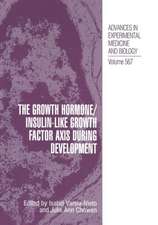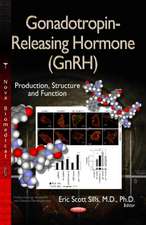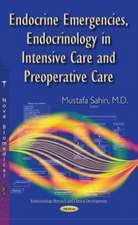Metabolic Syndrome: From Mechanisms to Interventions
Editat de Satinath Mukhopadhyay, Sunetra Mondalen Limba Engleză Paperback – 9 noi 2023
- Presents a holistic, preventative strategy involving each and every aspect of metabolic syndrome, from pathophysiologic to clinical management
- Discusses recent research on the role of inflammation, adipokines and myokines in metabolic syndrome
- Includes cutting-edge information on the impact of bariatric surgery and role of gut microbiota in MetS
- Provides flowcharts and diagrams to simplify pathophysiologic aspects and their association between risk factors
Preț: 1014.30 lei
Preț vechi: 1067.68 lei
-5% Nou
Puncte Express: 1521
Preț estimativ în valută:
194.15€ • 210.96$ • 163.19£
194.15€ • 210.96$ • 163.19£
Carte disponibilă
Livrare economică 31 martie-14 aprilie
Livrare express 15-21 martie pentru 92.59 lei
Preluare comenzi: 021 569.72.76
Specificații
ISBN-13: 9780323857321
ISBN-10: 0323857329
Pagini: 700
Ilustrații: 75 illustrations (50 in full color)
Dimensiuni: 216 x 276 x 35 mm
Greutate: 1.86 kg
Editura: ELSEVIER SCIENCE
ISBN-10: 0323857329
Pagini: 700
Ilustrații: 75 illustrations (50 in full color)
Dimensiuni: 216 x 276 x 35 mm
Greutate: 1.86 kg
Editura: ELSEVIER SCIENCE
Public țintă
Primary: Clinicians and researchers focused on endocrinology, cardiology, vascular disease; other health care workers in related fields.Secondary: Health professionals and researchers working with hepatology, gynecology, bariatric surgeries, and epidemiology.
Cuprins
Section 1: Introduction to Metabolic Syndrome
1. Beyond the Metabolic Syndrome: Adverse Lifelong Influences Emanating From Insulin Resistance On The Aging Process In Non-Diabetics
2. Metabolic syndrome- is it a disease or a risk factor for other disorders?
3. Intrauterine malnutrition and future risk of Metabolic Syndrome
4. Intervening at the stage of metabolic syndrome to prevent type 2 diabetes- is it justified?
5. Dietary fats and Metabolic Syndrome: How strong is the association?
6. Metabolic Syndrome needs treatment but with lifestyle interventions alone
Section 2: Epidemiology of Metabolic Syndrome
7. Epidemiology of Metabolic Syndrome: Global Scenario
8. Epidemiology of Metabolic Syndrome in South and South East Asians
9. Barker's Hypothesis and Metabolic Syndrome
10. Metabolic syndrome in Australian aborigines
Section 3: Pathogenesis and pathophysiology of Metabolic Syndrome
11. Diet in the pathogenesis of metabolic syndrome: Role of Sugar, salt and fat
12. Vitamin D deficiency and metabolic syndrome – Is there a causality?
13. Role of inflammation in the pathogenesis of Metabolic Syndrome
14. Role of oxidative stress in the pathogenesis of Metabolic Syndrome
15. Mitochondrial dysfunction and Metabolic syndrome
16. The entero-insular axis and metabolic syndrome
17. Type I interferons in metabolic syndrome
18. Immunometabolism, an emerging subspecialty of Metabolic Syndrome
19. Pathophysiology of metabolic syndrome: current concepts
20. Role of Circadian rhythms in Metabolic Syndrome
21. Ectopic fat distribution and its role in Metabolic Syndrome
22. The role of genetic and epigenetic factors in familial clustering of metabolic syndrome
23. High carbohydrate diet in the pathogenesis of Metabolic Syndrome
24. Endocrine disruptors in the pathogenesis of metabolic syndrome
25. Autoimmunity and Metabolic Syndrome
Section 4: Metabolic Syndrome – multisystemic manifestation
26. The burden of atherosclerotic cardiovascular disease in metabolic syndrome
27. Mechanisms of atherosclerosis in metabolic syndrome
28. NAFLD, the hepatic manifestation of metabolic syndrome
29. Obesity associated hypogonadism - a growing concern in metabolic syndrome
30. Sleep apnea – A cause or a consequence of Metabolic Syndrome?
31. The metabolic syndrome in psychiatry
32. Renal manifestations of Metabolic Syndrome: The link between obesity and chronic kidney disease
33. Unraveling neuropathic manifestations of metabolic syndrome: role of corneal confocal microscopy
34. Metabolic Syndrome and Periodontitis: pathophysiologic links and clinical implications
35. Metabolic Syndrome and Bone Health
36. Insulin resistance and the risk of Osteoporosis
37. Glucagon and Metabolic Syndrome
Section 5: Clinical assessment of Metabolic Syndrome
38. Measures of adiposity– from BMI to Waist circumference to neck circumference to body fat
39. The Role of Prediabetes in the Metabolic Syndrome
40. Assessment of insulin resistance: from the bench to bedside
Section 6: Management of Metabolic Syndrome
41. Dietary interventions to combat obesity and Metabolic Syndrome
42. Role of precision diet and intermittent fasting in the management of metabolic syndrome
43. Nutritional and Cognitive interventions to reduce cardiovascular risk in Metabolc Syndrome
44. Role of exercise in the prevention and management of Metabolic Syndrome
45. Should Vitamin D be used to treat Metabolic Syndrome?
46. Pharmacologic therapies in Metabolic syndrome with special reference to NAFLD
47. Role of newer anti-diabetes drugs in prediabetes: A systematic review
48. Management of Insulin resistance in PCOS
49. The role of bariatric surgery in the management of metabolic syndrome
50. Anti-inflammatory interventions to mitigate cardiovascular risk in metabolic syndrome
51. Management of new onset dysglycemia in transplant recipients
52. Prevention of Type 2 diabetes in Metabolic Syndrome: Role of the geneticist
53. Managing Metabolic Syndrome in a general practice setting
54. Dietary interventions to reduce cardiovascular risk in Metabolic Syndrome
55. Management of Lipid Abnormalities in Metabolic Syndrome
Section 7: Metabolic Syndrome in children and adolescents
56. Overview of metabolic syndrome in children and adolescents
57. Overview of metabolic syndrome in children and adolescents: Indian perspective
58. Metabolic syndrome in children and adolescents: Does ethnicity matter?
59. NAFLD in children and adolescents
60. PCOS in adolescents: Role of insulin resistance
61. The inter relationship between polycystic ovary syndrome (PCOS) and metabolic syndrome
62. Dietary interventions to improve cardiometabolic health outcomes in children and adolescents
Section 8: Metabolic Syndrome: Controversies to consensus
63. Metabolic Syndrome -are our definitiond fit for purpose?
64. Metabolic Syndrome: treat the whole or address each part?
65. Metabolic Syndrome and cancer risk
Section 9: Areas for future research
66. Assessment of abdominal obesity: to measure visceral fat, subcutaneous fat or both?
67. Obesity-mediated insulin resistance in target tissues: Role of adipokines, hepatokines and myokines
68. Can bariatric surgery cure metabolic syndrome?
69. Gut microbiota and metabolic syndrome: what’s new?
70. COVID19 and metabolic syndrome – an unholy alliance
71. MicroRNA modulation in metabolic syndrome: a novel insight in cardiometabolic disease
72. Role of artificial intelligence in tackling the metabolic syndrome pandemic
73. Glucose handling by the brain and its impact on metabolic syndrome
74. Impact of Hypoglycemia on cardiovascular risk in metabolic syndrome
75. Dietary interventions to combat obesity in metabolic syndrome- role of time restricted eating
1. Beyond the Metabolic Syndrome: Adverse Lifelong Influences Emanating From Insulin Resistance On The Aging Process In Non-Diabetics
2. Metabolic syndrome- is it a disease or a risk factor for other disorders?
3. Intrauterine malnutrition and future risk of Metabolic Syndrome
4. Intervening at the stage of metabolic syndrome to prevent type 2 diabetes- is it justified?
5. Dietary fats and Metabolic Syndrome: How strong is the association?
6. Metabolic Syndrome needs treatment but with lifestyle interventions alone
Section 2: Epidemiology of Metabolic Syndrome
7. Epidemiology of Metabolic Syndrome: Global Scenario
8. Epidemiology of Metabolic Syndrome in South and South East Asians
9. Barker's Hypothesis and Metabolic Syndrome
10. Metabolic syndrome in Australian aborigines
Section 3: Pathogenesis and pathophysiology of Metabolic Syndrome
11. Diet in the pathogenesis of metabolic syndrome: Role of Sugar, salt and fat
12. Vitamin D deficiency and metabolic syndrome – Is there a causality?
13. Role of inflammation in the pathogenesis of Metabolic Syndrome
14. Role of oxidative stress in the pathogenesis of Metabolic Syndrome
15. Mitochondrial dysfunction and Metabolic syndrome
16. The entero-insular axis and metabolic syndrome
17. Type I interferons in metabolic syndrome
18. Immunometabolism, an emerging subspecialty of Metabolic Syndrome
19. Pathophysiology of metabolic syndrome: current concepts
20. Role of Circadian rhythms in Metabolic Syndrome
21. Ectopic fat distribution and its role in Metabolic Syndrome
22. The role of genetic and epigenetic factors in familial clustering of metabolic syndrome
23. High carbohydrate diet in the pathogenesis of Metabolic Syndrome
24. Endocrine disruptors in the pathogenesis of metabolic syndrome
25. Autoimmunity and Metabolic Syndrome
Section 4: Metabolic Syndrome – multisystemic manifestation
26. The burden of atherosclerotic cardiovascular disease in metabolic syndrome
27. Mechanisms of atherosclerosis in metabolic syndrome
28. NAFLD, the hepatic manifestation of metabolic syndrome
29. Obesity associated hypogonadism - a growing concern in metabolic syndrome
30. Sleep apnea – A cause or a consequence of Metabolic Syndrome?
31. The metabolic syndrome in psychiatry
32. Renal manifestations of Metabolic Syndrome: The link between obesity and chronic kidney disease
33. Unraveling neuropathic manifestations of metabolic syndrome: role of corneal confocal microscopy
34. Metabolic Syndrome and Periodontitis: pathophysiologic links and clinical implications
35. Metabolic Syndrome and Bone Health
36. Insulin resistance and the risk of Osteoporosis
37. Glucagon and Metabolic Syndrome
Section 5: Clinical assessment of Metabolic Syndrome
38. Measures of adiposity– from BMI to Waist circumference to neck circumference to body fat
39. The Role of Prediabetes in the Metabolic Syndrome
40. Assessment of insulin resistance: from the bench to bedside
Section 6: Management of Metabolic Syndrome
41. Dietary interventions to combat obesity and Metabolic Syndrome
42. Role of precision diet and intermittent fasting in the management of metabolic syndrome
43. Nutritional and Cognitive interventions to reduce cardiovascular risk in Metabolc Syndrome
44. Role of exercise in the prevention and management of Metabolic Syndrome
45. Should Vitamin D be used to treat Metabolic Syndrome?
46. Pharmacologic therapies in Metabolic syndrome with special reference to NAFLD
47. Role of newer anti-diabetes drugs in prediabetes: A systematic review
48. Management of Insulin resistance in PCOS
49. The role of bariatric surgery in the management of metabolic syndrome
50. Anti-inflammatory interventions to mitigate cardiovascular risk in metabolic syndrome
51. Management of new onset dysglycemia in transplant recipients
52. Prevention of Type 2 diabetes in Metabolic Syndrome: Role of the geneticist
53. Managing Metabolic Syndrome in a general practice setting
54. Dietary interventions to reduce cardiovascular risk in Metabolic Syndrome
55. Management of Lipid Abnormalities in Metabolic Syndrome
Section 7: Metabolic Syndrome in children and adolescents
56. Overview of metabolic syndrome in children and adolescents
57. Overview of metabolic syndrome in children and adolescents: Indian perspective
58. Metabolic syndrome in children and adolescents: Does ethnicity matter?
59. NAFLD in children and adolescents
60. PCOS in adolescents: Role of insulin resistance
61. The inter relationship between polycystic ovary syndrome (PCOS) and metabolic syndrome
62. Dietary interventions to improve cardiometabolic health outcomes in children and adolescents
Section 8: Metabolic Syndrome: Controversies to consensus
63. Metabolic Syndrome -are our definitiond fit for purpose?
64. Metabolic Syndrome: treat the whole or address each part?
65. Metabolic Syndrome and cancer risk
Section 9: Areas for future research
66. Assessment of abdominal obesity: to measure visceral fat, subcutaneous fat or both?
67. Obesity-mediated insulin resistance in target tissues: Role of adipokines, hepatokines and myokines
68. Can bariatric surgery cure metabolic syndrome?
69. Gut microbiota and metabolic syndrome: what’s new?
70. COVID19 and metabolic syndrome – an unholy alliance
71. MicroRNA modulation in metabolic syndrome: a novel insight in cardiometabolic disease
72. Role of artificial intelligence in tackling the metabolic syndrome pandemic
73. Glucose handling by the brain and its impact on metabolic syndrome
74. Impact of Hypoglycemia on cardiovascular risk in metabolic syndrome
75. Dietary interventions to combat obesity in metabolic syndrome- role of time restricted eating

























